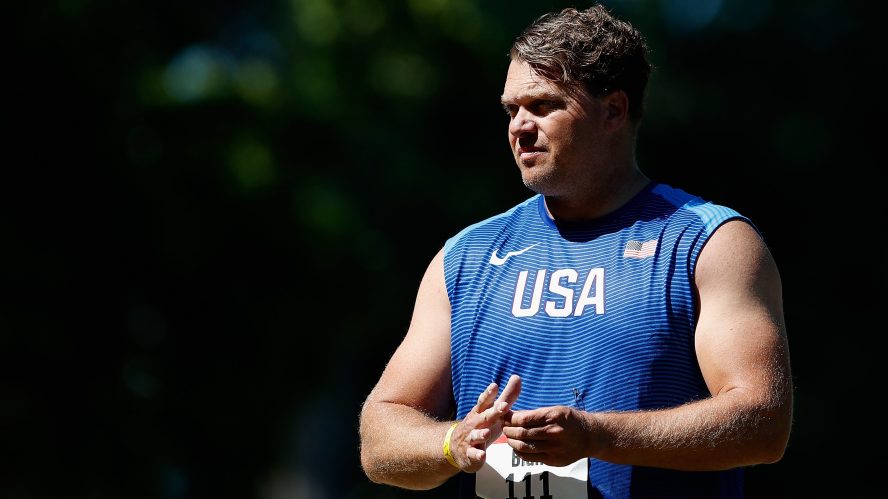All his life, David Blair has been told what he could not do. Born with a clubfoot, he was told by a doctor at a young age not to even try playing sports. He did it anyway, through constant, excruciating pain, and eventually beat non-disabled athletes to win the Utah state championship in the discus throw.
But even to him, it really did seem like he could not make it to this summer’s Paralympic Games in Tokyo. After winning a gold medal at the Paralympic Games Rio 2016 with a world-record throw, Blair broke his foot and injured his back in 2019.
So how did he make the U.S. Paralympic team again, at age 45? Blair credits the Paralympic mindset.
“It doesn’t even cross our minds that we maybe shouldn’t be doing this, because of a deformity, or because of any type of handicap that we might have,” he said. “It doesn’t necessarily occur to us to do it any other way than to adapt to what we have and go forward.”
Salesforce powers Team USA fan communities
Salesforce has partnered with NBCUniversal to support its Olympic and Paralympic Games coverage across platforms through the 2028 Games. NBCU will also use Salesforce technology to build amazing Olympic and Paralympic fan communities.



It’s a way of thinking that Blair believes can be useful not only in sports, and not only for people with disabilities, but for anyone in business. He has seen it himself, in his career as a database programmer. It is essentially learning when to ignore the alarm bells the human brain is conditioned to sound at the prospect of a problem or obstacle.
Blair cited the 2018 bestselling book, “Can’t Hurt Me: Master Your Mind and Defy the Odds” by David Goggins, a retired Navy SEAL. The book put into words what Blair said he and other Paralympic athletes have long felt.
“There’s so many times where we think that there’s so much going against us,” Blair said. “And, in reality, there’s still more that we can do. Our goal as humans is to always stay and be safe, but sometimes your level of threat detection is exaggerated. And it carries over into a ton of stuff in the office.”
Driving business transformation
In one of his first jobs, as a database administrator at a logistics company in the early 2000s, Blair told his manager that she was relying on an antiquated process, where software issues had to be managed on a spreadsheet. His manager didn’t like it, telling him he was hired to manage the process – not revamp it. Blair rewrote the entire process anyway.
His success there propelled him to a small healthcare technology company, where he used Salesforce products to help medical practices re-engage with lapsed patients and get them back in the office. Using innovative technology to drive business transformation has been a constant in his career, even if at times it would have been easier to accept the status quo.
“A lot of us will see that very first resistance and say, ‘Ooh, probably got to pull back, not pursue this anymore, see if we can adjust,’” Blair said. “Whereas some of us have had enough adversity at a constant level that it doesn’t even register as a blip on the radar screen.”
For Blair, adversity is just part of daily life. Clubfoot is a birth defect in which the foot is turned inward and downward. Blair describes his as stiff but painful – he has limped all his life. “It’s like a prosthetic, but it’s alive,” he said.
The discus throw is inherently painful for him – a doctor recently told him it has likely caused hundreds of stress fractures in his foot. The Paralympic Track and Field event is a contest to see who can throw a small discus the farthest. Power comes not from the arms but from the rotation of the body inside a roughly 8-foot circle. Strong footwork is key.
Blair discovered the sport during high school and played it through college at Weber State. He didn’t throw again for around 15 years, until he realized he was eligible to compete in the Paralympic Games. It was only about a year later that he won the gold medal, with a record throw of 64.11 meters.
The Paralympic Games as a platform for change
Even that triumphant moment came with a sign of hardship to come. Blair said his parents stayed back in Utah to be with his sister, Janay, who was struggling with mental health issues. She died by suicide in 2018, after which Blair became focused on mental health advocacy. He published a letter to his sister last year, hoping to raise awareness about the issue. And he plans to start a nonprofit with the aim of getting Olympians and Paralympians in front of schoolchildren to talk about suicide prevention.
The Olympic and Paralympic Games, like business, Blair believes, can be a platform for change.
“That’s kind of why,” he said, when thinking about qualifying for the Paralympics again, he thought, “‘OK, I’ve got to pursue this. I’ve got to do this.’ Because, I mean, we look up to basketball, we look up to these sports stars. But the Olympians and Paralympians, in my mind, and in a lot of people’s minds, are extraordinary.”
Discover your ideal career in the cloud
An estimated 4.2 million jobs will be created in the Salesforce ecosystem by 2024. Find out which Salesforce career is right for you.























![[Customer service career path]: A picture of Shonnah Hughes smiling in her maroon Serviceblazer hoodie](https://www.salesforce.com/blog/wp-content/uploads/sites/2/2024/06/Serviceblazer-Shonnah-Hughes.jpg?w=128&h=96&crop=1&quality=75)






